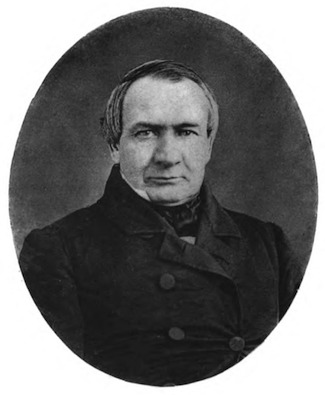John Jolliffe

Image of John Jolliffe from Historical, genealogical, and biographical account of the Jolliffe family of Virginia, 1652 to 1893 (1893), before p. 223.
John Jolliffe was an antislavery lawyer who attempted to prosecute the kidnappers of Henrietta Wood in 1853.1 He worked with other area attorneys like Salmon Chase.2
Jolliffe, together with James Birney, also defended George Washington McQuerry, an enslaved man who had escaped from Kentucky in 1849 and settled in Miami County, Ohio, in the case of Miller v. McQuerry. When his owner found him in 1853 and had McQuerry arrested, black activists in Cincinnati rallied to his defense, applying for a writ of habeas corpus to prevent his removal to Kentucky.
In September 1853, he was assaulted by proslavery Democratic Judge Flinn of the Cincinnati Criminal Court, the same judge who earlier in the year presided over the cases of Rebecca Boyd and the kidnappers of Henrietta Wood in Wood v. Ward. The impetus for the assault, and the fallout from what became known as the “Flinn-Jolliffe affair,” is discussed in weisenburger1998, p. 95-98.
He was later assaulted by a mob in Covington for his work helping fugitive slaves.
He was also involved in the defense of Margaret Garner in 1856, and attempted to argue that the Garners had been freed by their visits to Cincinnati, or that they should be turned over to Ohio state officials to answer murder charges instead of being returned to slavery in Kentucky, though he famously failed.3
See also weisenburger1998; William Jolliffe, Historical, genealogical, and biographical account of the Jolliffe family of Virginia, 1652 to 1893 (Philadelphia: J. B. Lippincott, 1893), 223-32.
Jolliffe wrote at least two antislavery novels, including Belle Scott (which was being completed in 1856 when Margaret Garner case broke), and Chattanooga (which was obviously modeled on the Garner story).4 The first enslaved character in Belle Scott was a man “born free” but then “kidnapped” and enslaved; he later makes it to Ohio before being captured and taken back across the river.
The 1853 Cincinnati City Directory at Cincinnati History Library and Archives lists “Joliffe and Gitchell” (attorneys at law) in Gazette Building, 120 Main, and Joliffe’s home on 248 Race.
“That Kidnapping Case,” Cincinnati Enquirer, June 8, 1853.↩
On relationship between antislavery lawyers and black community in Cincinnati, see taylor2005, 115.↩
See taylor2005, 159-60. In both the McQuerry and Garner cases, it was a Judge McLean who upheld the Fugitive Slave Law and decided against Jolliffe.↩
weisenburger1998, 92.↩
